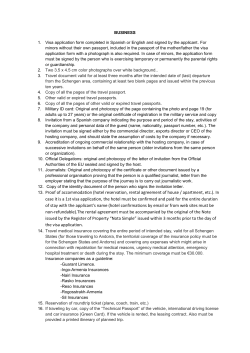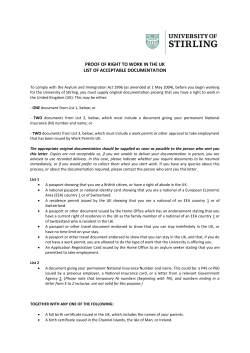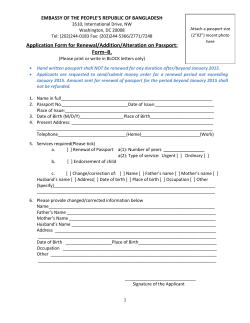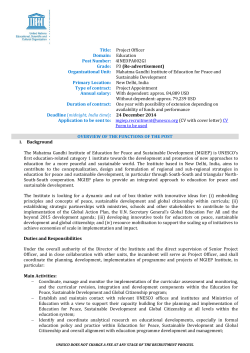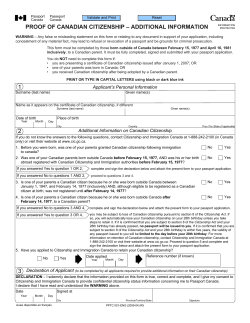
R New Rules For Getting A Social Security Number And Card
New Rules For Getting A Social Security Number And Card R ecent provisions in law have changed the rules for assigning a Social Security number and issuing a Social Security card. This fact sheet gives the most up-to-date information available on the documents needed to apply for a Social Security number and card. All documents must be either originals or copies certified by the issuing agency. We cannot accept photocopies or notarized copies of documents. Proof of citizenship and identity To get a Social Security number or a replacement card, you must prove your U.S. citizenship or immigration status, age and identity. For a replacement card, proof of your U.S. citizenship and age are not required if they are already in our records. Under the new law, only certain documents can be accepted as proof of U.S. citizenship. These include your U.S. birth certificate, a U.S. passport, a Certificate of Naturalization or a Certificate of Citizenship. If you are not a U.S. citizen, different rules apply for proving your immigration status, and those rules have not changed. Also under the new law, only certain documents can be accepted as proof of identity. An acceptable document must show your name, identifying information about you and preferably a recent photograph. If you are a U.S. citizen, Social Security must see your: • U.S. driver’s license; • State-issued nondriver identity card; or • U.S. passport. If you do not have these specific documents or cannot get a replacement for them within 10 days, we will ask to see other documents, including: • Employee ID card; www.socialsecurity.gov • School ID card; • Health insurance card (not a Medicare card); or • U.S. military ID card. If you are not a U.S. citizen, Social Security must see your current U.S. immigration documents. Acceptable documents from the Department of Homeland Security include your: • Form I-551 (includes machine-readable immigrant visa with your unexpired foreign passport); • I-94 with your unexpired foreign passport; or • Work permit card (I-766 or I-688B). Documents for a name change If you legally change your name because of marriage, divorce, court order or any other reason, you need to tell Social Security so that you can get a corrected card. If you are working, also tell your employer. If you do not tell us when your name changes, it may: • Delay your tax refund; and • Prevent your wages from being posted correctly to your Social Security record, which may lower the amount of your future Social Security benefits. If you need to change your name on your Social Security card, you must show us a recently issued document as proof of your legal name change. Documents Social Security may accept to prove a legal name change include: • Marriage document; • Divorce decree; • Certificate of Naturalization showing a new name; or • Court order for a name change. (over) New Rules For Getting A Social Security Number And Card If the document you provide as evidence of a legal name change does not give us enough information to identify you in our records or if your document was issued more than two years ago, you must provide Social Security with additional documentation. Marriage, divorce or annulment: In addition to showing us a legal document proving your marriage, divorce or annulment, you must provide an identity document. That document must show your old name, as well as other identifying information or a recent photograph. (We can accept an expired document as evidence of your old name.) Adoption, naturalization or other name change: In addition to showing us a legal document citing your new name, such as a court order, adoption decree or Certificate of Naturalization, you must provide us with two identity documents, including: • One identity document in your old name (which can be expired); and • One identity document in your new legal name, which must be current (unexpired) Both of these documents must show identifying information or a recent photograph. Citizenship: Also, if you are a U.S. citizen born outside the United States and our records do not show you are a citizen, you will need to provide proof of your U.S. citizenship. If you a not a U.S. citizen, Social Security will ask to see your current immigration documents. Your new card will have the same number as your previous card, but will show your new name. Verification of birth records Social Security must verify a birth record for all U.S.-born applicants of any age who apply for an original Social Security number. An exception is made when a parent applies for a baby’s Social Security number at the hospital when the baby is born. Social Security must also verify a birth record for U.S.-born individuals who ask to correct the date of birth on our records. To verify a birth record, Social Security will contact the office that issued it. NOTE: For Social Security purposes, “U.S.born” means a person born in the 50 states, the District of Columbia, American Samoa, Guam, the Northern Mariana Islands, Puerto Rico and the U.S. Virgin Islands. Limits to replacement cards You can replace your Social Security card for free if it is lost or stolen. However, you may not need to get a replacement card. Knowing your Social Security number is what is important. You are limited to three replacement cards in a year and 10 during your lifetime. Legal name changes and changes in noncitizen status that require card updates may not count toward these limits. Also, you may not be affected by these limits if you can prove you need the card to prevent a significant hardship. Contacting Social Security For more information and to find copies of our publications, visit our website at www.socialsecurity.gov or call toll-free, 1-800-772-1213 (for the deaf or hard of hearing, call our TTY number, 1-800-325-0778). We treat all calls confidentially. We can answer specific questions from 7 a.m. to 7 p.m., Monday through Friday. We provide information by automated phone service 24 hours a day. We also want to make sure you receive accurate and courteous service. That is why we have a second Social Security representative monitor some telephone calls. Social Security Administration SSA Publication No. 05-10120 November 2008 (Destroy prior editions) www.socialsecurity.gov
© Copyright 2026
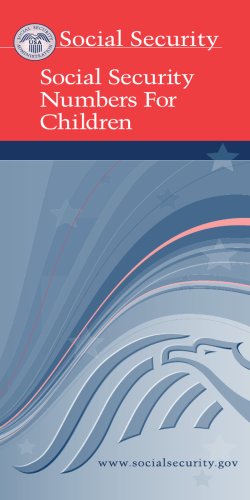

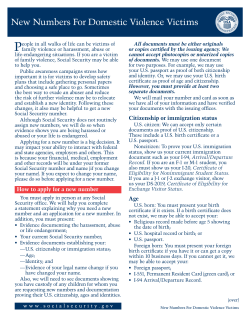
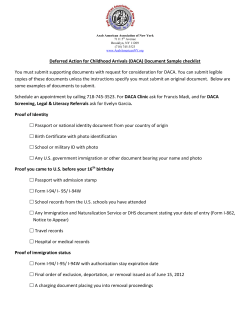




![YFactor: where is [y]our future?](http://cdn1.abcdocz.com/store/data/000700657_1-6eba21aad9c373dddcc2ef6875637728-250x500.png)
